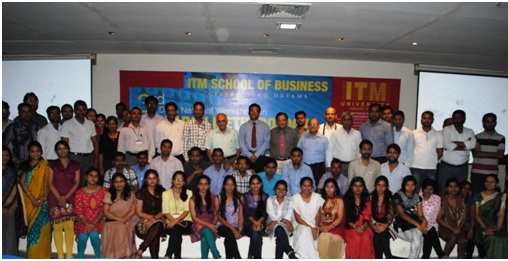|
|
3rd seven days national workshop on SPSS 20.0 for Research Methodology and Management

ITM School of Business, ITM University in association with IBM SPSS South Asia organised the 3rd seven days national workshop on SPSS 20.0 for Research Methodology and Management to address challenges and opportunities in the field of research from . A new software product SPSS now known as IBM SPSS Statistics 20.0 has enabled academicians and researchers to obtain valuable information from the data. Basic knowledge on SPSS is vital for all users before they proceeded to survey and data analysis. But very often people have inadequate knowledge about the basic operation of SPSS programme. This seven day workshop was for the beginners with little or no experiences in SPSS software who want to acquire the skills and knowledge of getting started in to this software. The programme simply aimed at developing the pedagogical and research skills participants.
On the first day of the workshop the expert from the SPSS South Asia Mr Saurabh Agarwal explained the basic options of SPSS software like data exploration, description and crosstabs, t/Z test, Bivariate Correlation and Simple Regression. He also explained advances options like univariate GLM and multivariate options.
On the second and Third day of the workshop Prof N.K Sharma from IIT Kanpur explained the basics of hypothesis testing, Type 1 and 2 Errors and the power of a statistical test. He also explained about the basic requirements of correlation and regression and also when these requirement are violated, their diagnosis and possible treatments one of them was the problem of multicolliniarity and violation of homoscedasticity. He also explained the basics of Factor Analyses and how and in what conditions it should be applied.
On the fourth day Prof N.K Sharma explained, defined and interpreted various kinds of output of factor analysis. Also the basics of Cluster Analyses were defined with the help of SPSS and also various kinds of Cluster Analyses were performed on the SPSS. Various outputs of Cluster Analyses were also examined.
On the fifth day Honourable Vice Chancellor of ITM University Prof. Yogesh Upadhyay firstly aligned all the learning of previous session to the current one and then took in- depth session on the basic descriptive statistics like Measures of Central Tendency and Measures of Dispersion and the critical information they provide to a researcher. He also emphasised on the need of Data exploration and refinement before applying any statistical routine through SPSS software. The all-important concepts of Skewedness and Kurtosis were also discussed.
On the sixth day Prof. Yogesh Upadhyay explained the need of Data Transformation and various problems it can solve for a researcher. He then took the previously discussed concept of Hypothesis testing to another level by a detailed discussion on Normal Distribution, One/ Two Tailed tests, directional/Non Directional Hypothesis and related the concepts to our day to day life. The concepts of Bivariate correlations and Simple/Multiple Regression, their assumption together with the critical concepts of Partial and Semi partial Correlation were also explained and performed on the SPSS Software and their outputs examined. Various Assumptions of regression were explained and also shown graphically in the SPSS.
On the seventh and last day of the workshop Prof. Yogesh Upadhyay discussed about the Experimental Designs and then the discussion was related with the One/Two way ANOVA and MANOVA. An in-depth session was taken on various Post-Hoc Tests and Assumptions of ANOVA. The concept of variable Interaction was also discussed and performed on SPSS with Graphical Outputs. The concepts of Effect Size and Use of Eta Square in value t/Z/ANOVA was also discussed and compared with the concepts of coefficient of Determination in simple/Multiple Regression. The concept of Point-Bi serial Correlation was also discussed.
In the last session Prof. Manoj Patwardhan from ABV IIITM Gwalior discussed about Plagiarism and negative impact it possess for a researcher. He took various examples where plagiarism has spoilt the careers of many researchers.
|



